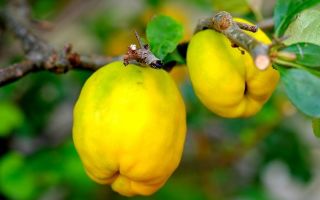Quince is a low fruit tree native to Persia, Greece and the island of Cyprus. Now found in wild and cultivated forms in the Caucasus and Crimea.
Description and composition
Ripe quince fruits contain
- up to 10.85% sugar (glucose, fructose and sucrose),
- tannins,
- propectins (4.7%),
- acids - malic, tartaric, citric,
- mineral salts,
- vitamin C (10-20 mg%),
- essential oil,
- phytocides.
The skin of the fruit contains enanthic-ethyl and pelargan-ethyl esters, which give the fruits a peculiar smell.
The seeds contain
- about 20% mucus, easily swelling in water,
- fatty oil (up to 20%),
- starch,
- tannins,
- protein substances,
- amygdalin glucoside (0.53%).
How to use quince for health?
The first recipes from quince for the treatment of the gastrointestinal tract are found already in ancient medicine, including Avicenna.
The fruits, when raw, are tasteless and astringent. Therefore, they are consumed in the form of compotes, jams, marmalades, and baked goods.
In folk medicine in many countries, a decoction of the fruit (compote) is used for gastrointestinal diseases to improve intestinal activity.
Grated and boiled fruits are useful for liver diseases, as an antiemetic and for hemoptysis.
Quince fruit tea is used as a diuretic for dropsy.
Quince seeds are used as an enveloping, emollient agent for
- diarrhea,
- gastroenteritis,
- spastic colitis,
- tracheitis and
- bronchitis.
To do this, pour 10 grams of whole seeds into a glass of warm water, let it brew, shaking from time to time until a mucous liquid is obtained.
Externally, the infusion is used as a lotion for eye diseases, for rinsing with sore throat, and for facial skin as a cosmetic product.
Contraindications
It is necessary to take into account that quince fruits, even when boiled and baked, have an astringent property, especially if they are not well cooked. People with a tendency to spasms of the esophagus and intestines should better refrain from using it or use it with caution.







